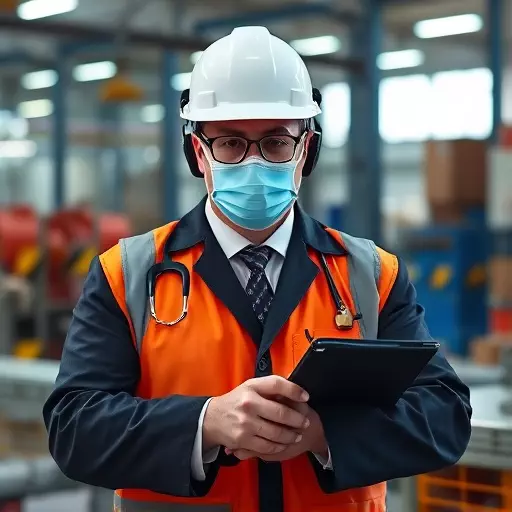Expert witness testimony is pivotal in workplace cases, particularly those involving health and safety claims. Occupational health experts provide unbiased assessments of organizational operations, helping courts understand technical aspects and navigate complex legal matters. They analyze accidents, assess protocol adherence, and offer recommendations for improvement, establishing liability and ensuring compliance with workplace safety standards. Their testimony is crucial for just outcomes and enhanced workplace safety. In these cases, evaluating the credibility of expert witnesses, focusing on their expertise, qualifications, experience, objectivity, and track record, is essential to ensure the integrity of the outcome.
In the complex landscape of legal disputes involving workplace accidents or health issues, expert witness testimony plays a pivotal role. This article delves into the critical evaluation process of such experts, especially in occupational health matters. We explore the significance of understanding expert witnesses’ contributions during trials, focusing on their credibility assessment. Key aspects include evaluating compliance with workplace safety standards and scrutinizing report quality. Additionally, we provide strategies for effective cross-examination, supported by real-world case studies, offering valuable insights for legal professionals navigating these intricate cases.
- Understanding Expert Witness Testimony in Workplace Cases
- The Role of Occupational Health Experts
- Evaluating Credibility: Criteria and Considerations
- Workplace Safety Standard Compliance: A Key Aspect
- Quality Assurance in Expert Reports
- Cross-Examination Techniques for Effective Challenges
- Case Studies: Success Stories and Lessons Learned
Understanding Expert Witness Testimony in Workplace Cases

Expert witness testimony plays a pivotal role in workplace cases, especially when evaluating claims related to workplace safety and health. These professionals are often engaged to provide unbiased assessments and insights into specific aspects of an organization’s operations, particularly concerning compliance with established occupational health and safety standards. Their expertise is crucial for navigating complex legal matters and helping courts understand technical or specialized issues.
In the context of workplace cases, expert witnesses with a strong background in occupational health can offer valuable testimony. They analyze factors contributing to accidents or injuries, assess whether safety protocols were followed, and provide recommendations for improvement. This testimony helps establish liability, identify negligence, and ensure that organizations maintain adherence to relevant workplace safety standards. Their insights are instrumental in reaching just outcomes and enhancing overall workplace safety.
The Role of Occupational Health Experts

Occupational health experts play a pivotal role in evaluating and presenting evidence related to workplace safety and health. In many cases involving injuries, illnesses, or deaths on the job, these specialists are called upon as expert witnesses to provide crucial insights and expert witness testimony. Their expertise is essential when navigating complex legal proceedings, especially in employment law and workers’ compensation claims.
These professionals possess a deep understanding of workplace safety standards and regulations, allowing them to assess whether an employer has complied with relevant laws. Through meticulous investigation and analysis, they can help uncover breaches in protocol that may have contributed to adverse health outcomes for employees. The clarity and credibility brought by their expert testimony are invaluable in court, guiding juries or judges through the intricacies of occupational health matters and ultimately influencing the outcome of workplace cases.
Evaluating Credibility: Criteria and Considerations

Evaluating an expert witness’s credibility is a meticulous process, especially in complex legal matters such as workplace cases. When presenting expert witness testimony for workplace cases and occupational health expert testimony, several key criteria must be considered to ensure reliability and admissibility. These include the individual’s expertise, qualifications, and experience relevant to the case, as well as their objectivity and impartiality.
The credibility assessment should delve into the expert’s understanding of workplace safety standards compliance and their ability to interpret complex data or evidence. It’s crucial to examine if they have a proven track record of accurate predictions or conclusions in similar cases. Additionally, the potential biases or financial interests that might influence their testimony should be scrutinized, as these could impact the integrity of the case’s outcome.
Workplace Safety Standard Compliance: A Key Aspect

In many workplace cases involving injuries or hazards, understanding and evaluating workplace safety standard compliance is paramount. Expert witness testimony for these cases plays a crucial role in deciphering complex regulatory requirements and their implications. Occupational health experts are often called upon to provide clear and concise interpretations of these standards, ensuring that all parties involved grasp the legal and practical expectations.
Their occupational health expert testimony must be grounded in an extensive knowledge of industry best practices, current regulations, and past enforcement actions. This involves delving into documentation, safety protocols, and training records to assess whether a workplace adheres to relevant safety standards. Such evidence is vital for determining liability, establishing negligence, or defending against accusations, ultimately shaping the outcome of legal proceedings related to workplace safety.
Quality Assurance in Expert Reports
In the context of expert witness testimony for workplace cases, the quality and integrity of expert reports are paramount. These reports serve as a crucial link between complex scientific or technical findings and their application in legal proceedings, particularly regarding workplace safety standards compliance and occupational health issues. Therefore, ensuring robust Quality Assurance (QA) processes is essential to maintain credibility.
Occupational health experts must adhere to rigorous QA protocols when preparing testimony. This includes verifying the accuracy of data sources, critically evaluating assumptions made during analysis, and meticulously documenting methodologies and findings. By implementing these practices, expert witnesses can provide reliable and unbiased occupational health expert testimony, strengthening their credibility in the court of law and assisting judges and juries in making informed decisions related to workplace safety.
Cross-Examination Techniques for Effective Challenges

Cross-examination is a critical component in challenging the credibility of an expert witness, especially in workplace cases involving complex issues like safety standards compliance and occupational health. Lawyers can employ various techniques to scrutinize the expertise, methodology, and conclusions presented by these witnesses. One effective strategy is to delve into their qualifications and experience, questioning whether they possess the necessary expertise in the specific field at hand. For instance, an occupational health expert should be able to demonstrate knowledge of industry-recognized standards and guidelines.
During cross-examination, it’s essential to explore the foundations of their testimony. This involves asking about the data sources, research methodologies, and any potential biases or limitations. In workplace cases, challenging the relevance and accuracy of case-specific data used by an expert witness can significantly undermine their credibility. For example, questioning the reliability of certain industry statistics or the methodology employed to collect and analyze them may reveal weaknesses in the expert’s testimony regarding compliance with occupational health standards.
Case Studies: Success Stories and Lessons Learned

Case studies offer invaluable insights into the effectiveness of expert witness testimony in workplace cases. Success stories highlight how qualified and credible experts can significantly influence legal outcomes, especially when addressing complex issues like workplace safety standards compliance and occupational health concerns. For instance, a well-respected occupational health expert’s testimony successfully persuaded a jury to award substantial damages in a case involving long-term exposure to hazardous chemicals, ultimately reshaping the company’s safety protocols.
Lessons learned from these studies underscore the importance of thorough preparation. Experts must be adept at translating technical knowledge into comprehensible explanations tailored to the court environment. Moreover, keeping up with evolving workplace safety regulations and staying connected to relevant research is crucial for providing accurate and up-to-date testimony, reinforcing the expert’s position as a reliable source of information in these cases.

